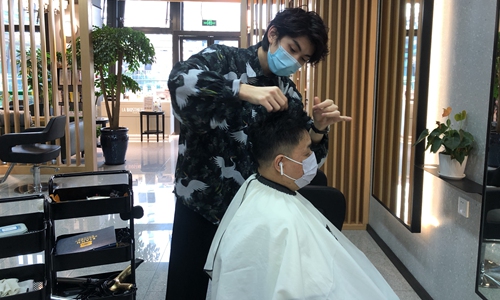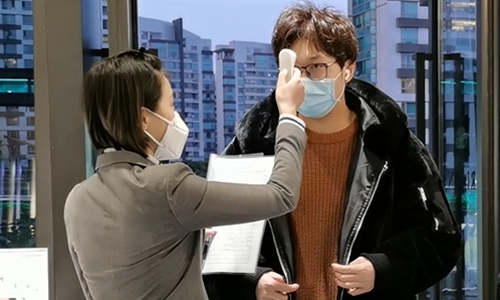HOME >> CHINA
Barbershop biz starts to resume for ‘haircut’ fest amid COVID-19
By Chen Shasha Source:Globaltimes.cn Published: 2020/2/24 4:49:54

A hairdresser at Riahn Variety Network Hair Castle in Shanghai trims hair for a customer on Sunday. Photo: Chen Shasha/GT

Salon staff at Riahn Variety Network Hair Castle in Shanghai takes temperature for a customer. Photo: Chen Shasha/GT
"Most of the discussions with customers have been about the epidemic," said Tu Jianjun, owner of the Mingjian barbershop in Hangzhou's Shangcheng district. Tu told the Global Times that since returning to work on February 19, business had dropped by one-third due to COVID-19.
Traditionally, the Chinese get their haircut during Longtaitou Festival (dragon raises its head), which falls on Monday, as they believe their heads on this specific day will guide them to luck and happiness.
Local residents are wondering when they can see "Mr Tony," a nickname for barbers in China, after spending almost one month inside their homes to help prevent the coronavirus from spreading, which was also enough time for their bangs to grow over their eyes.
The hashtag #DaysWithoutMrTony has received almost 20 million views on Chinese social media platform Weibo, where users make fun of their messy hair and upload photos after cutting their hair by themselves.
"People are either working online or having classes online now. How I wish Mr Tony could cut my hair online!," a Weibo user commented.
Tu predicts business for this year's Longtaitou Festival will not be as booming as previous years and said, "The number of customers on Longtaitou were three times more than on ordinary days."
Yet Tu maintains an optimistic attitude. "It feels good to come out of home and make money again," he smiled, noting that his community is encouraging small shops to resume business.
As the epidemic is still underway, Tu's clients have taken a cautious approach while looking forward to receiving a long-waited haircut.
"They've asked me if I had the official permit to resume work," he said. Customers who visit businesses in Hangzhou are also required to show a QR health code developed by Alibaba's Alipay that displays an individual's condition.
"I will only let them in when the code is green," Tu said.
The practice is echoed in Shanghai. Xian Zhexu, general manager of Riahn Variety Network Hair Castle, a chain salon, explained to the Global Times that his clients are required to show their health codes and recent travel history before they can get their haircut.
"Each customer needs to take their temperature and accept disinfection before we begin," Xian said. "Ventilation, facemasks, regular disinfection in the space, and tools are necessary at my shops.
To avoid crowds from developing, customers are required to make appointments beforehand. "On Longtaitou, people usually wait in long queues for a haircut," Xian said, adding that Monday is not fully booked.
Xian's stores are located in busy shopping malls. "The epidemic has definitely brought a lot of pressure on our future management, considering the rents, property management expenses, utilities, and labor costs," Xian said, but he is confident his salons will resume normal operations as the local government has rolled out measures to support businesses.
For Tu and Xian's counterparts in Northwest China's Shaanxi Province, the situation is bleak.
Lu Kun, a barber in Yanliang, Xi'an is waiting for the local government to notify him when he can resume business operations.
Lu estimated that he would only be open until local students resumed school. Shaanxi officials on February 10 announced that all schools in the province were forbidden to open before March 2 to contain COVID-19.
The epidemic could cause Lu to lose up to 50,000 yuan ($7,117) a month. But Lu also remains optimistic and said, "At least you have to be responsible for your own health and the others."
Lu said some private landlords have given exemptions on rent to support their tenants amid the outbreak. He is also considering speaking with his landlord after he opens his doors to customers.
People developed their skills at home without knowing when the neighborhood barbershops would reopen. Zhao, a local resident in Yanliang, bought a hair clipper online and gave his children haircuts, along with his grandfather and himself prior to the Longtaitou Festival.
"Actually, our tradition is never to shave your head during the first month of the Chinese Lunar New Year, but people are getting upset after staying at home for a month," Zhao said. "I also hope that by doing so, the bad luck and the epidemic will be gone earlier."
Posted in: SOCIETY